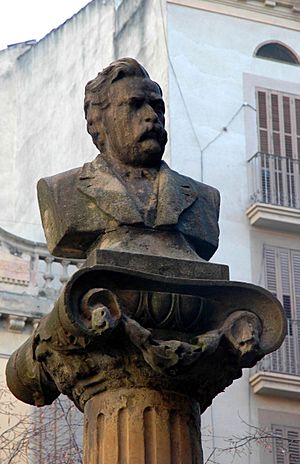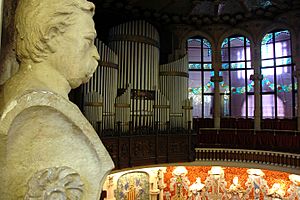Josep Anselm Clavé facts for kids
Quick facts for kids
Josep Anselm Clavé
|
|
|---|---|
 |
|
| Born |
Josep Anselm Clavé i Camps
April 21, 1824 Barcelona, Spain
|
| Died | February 24, 1874 (aged 49) Barcelona, Spain
|
| Other names | José Anselmo Clavé |
| Occupation | politician and composer |
Josep Anselm Clavé i Camps (born April 21, 1824 – died February 24, 1874) was an important Spanish politician, composer, and writer. He is famous for starting the choral singing movement in Catalonia. He also helped create many groups where people could work together and support each other.
Clavé began his musical journey by singing in coffee houses and taverns when he was just 17. He played the guitar and sang to earn money for his family. Meeting many workers in these places, he had an idea: to bring them together in singing groups instead of just taverns. He learned to play the violin and flute and studied music theory. This helped him write his own songs. In 1845, he started a singing group called Aurora. This group later became La Fraternitat (The Fraternity), which was a mutual help society and the first choir of its kind in Spain. In 1857, Clavé changed its name to Euterpe. Many Euterpenses societies spread across Catalonia and the Valencian Country. These groups were the start of the famous Cors de Clavé (Clavé Choirs).
As a politician, Clavé supported early leaders like Abdó Terrades and Narcís Monturiol. He took part in a protest against General Espartero in 1843 and was arrested in 1845. During a time of political change (1854–1856), he became more involved in politics. However, he was later sent to prison in Maó and Palma. In 1873, he was chosen to lead the Provincial Council of Barcelona. He also became a member of the Cortes Constituentes (a type of parliament) and a civil governor in Castelló de la Plana and Tarragona. He stopped his public work after a military takeover led by General Pavia.
Early Life and Musical Beginnings
Josep Anselm Clavé was born in Barcelona into a modest family. His father, Francesc Clavé, was a carpenter, and his mother, Agnès Camps, loved the arts. When he was six, Clavé lost sight in one eye due to an infection. This meant he had to leave school. He tried working as a lathe turner, but his eye problem made it difficult. He soon had to quit this job.
After leaving work, Clavé taught himself music and poetry. His mother's love for the arts inspired him. He learned about French literature and social ideas, which were important for his political views. Soon, his hobby of playing the guitar turned into a way to earn money. He began performing in different cafes in Barcelona. This is where his real musical journey started, playing popular music in taverns and fun places.
From a young age, Clavé was interested in left-wing politics and the Spanish republican movement. He worked with people like Narcís Monturiol and Abdó Terrades. Together, they helped create the first communist newspaper in Spain. Between 1840 and 1843, he was active in protests in Barcelona. Because of this, he was arrested and put in the military prison at Ciutadella.
When he returned to playing music in Barcelona's cafes, he noticed how much people liked his songs. He started creating more refined songs than those usually heard in these places. He offered them as a new and better option for the public.
Clavé and Choral Singing

Clavé became very popular. In 1845, some friends asked him to form a small orchestra called La Aurora. It had about twenty men playing different instruments like guitars and tambourines. These types of groups were common in Barcelona between 1845 and 1849. They helped set the stage for the growth of choral societies from 1850 onwards.
It was hard to find suitable music for such a mixed group like La Aurora. So, Clavé decided to have everyone sing, but in a way that kept different voices sounding good together. This led to the idea of creating a choral society. On February 2, 1850, he founded La Fraternitat, the first choir of its kind in Spain.
Through La Fraternitat, Clavé brought music and culture to working-class people. At that time, workers had long hours and tough conditions. They had little chance to enjoy fun activities, health, or education. So, what Clavé did was a big social change.
Following La Fraternitat's example, many other choirs soon started in Barcelona and nearby towns. This trend quickly spread across Catalonia. Singing choral music became a way for the working class to escape their hard lives.
In 1853, Clavé rented the Jardins de la Nimfa on Passeig de Gràcia to hold regular concerts. These concerts, started by La Fraternitat, faced opposition from the upper classes. They tried to stop these activities, including dance sessions. But Clavé's success continued, and the activities moved to the Camps Elisis, also on Passeig de Gràcia.
These activities were very successful until 1856. However, political problems and a crisis in 1855 led to Clavé being arrested and sent away to the Balearic Islands.
When he was released, Clavé picked up where he left off. In 1857, he organized shows in the Lutheran Gardens. This time, he didn't rely on other companies that might try to stop him. La Fraternitat was renamed the Societat Coreal Euterpe.
The popular shows and dances at the Lutheran Gardens were a huge hit. Concerts were held several times a day. Clavé decided to publish a program called Euterpe Echo. This newsletter shared event details, literary pieces, and news. It helped make the Euterpe Gardens even more popular.
Because many choirs wanted to follow Clavé's example, the Euterpense Association was founded in 1860. This was like a federation that brought choirs together. It gave them advice and music. It also helped prevent other choirs from competing with Clavé's groups. This way, they could control who had access to Clavé's music.
Between 1860 and 1864, the activities of this federation had a big impact. Thousands of singers and hundreds of musicians performed together. During this time, Clavé performed parts of Tannhäuser. This was the first time Wagner's music was heard in Spain. By then, there were eighty-four choral societies in Spain and even in Cuba. The Associació Euterprense published a newspaper called El Metrónomo in 1863–64. It shared news about Catalan choral activity.
In 1867, Clavé was arrested again and sent to Madrid. But even with him away, the activities of the Euterpe Gardens, the Societat Coral Euterpe, dances, and concerts continued as usual.
After the September Revolution in 1868, called La Gloriosa, Clavé's Choirs were no longer the main way to express Republican ideas. These ideas were now channeled through political parties. Clavé, who had always been involved in politics, held several public jobs. In 1868, he was part of the Revolutionary Board. The next year, he was Vice President of the Tortosa Pact. In 1871, he was elected as a deputy and became President of the Barcelona Provincial Council. In 1873, when the First Spanish Republic was formed, he became the civil governor of Castellón and the Government Delegate in Tarragona.
However, a military takeover by General Manuel Pavía on January 3, 1874, ended the Republic. All hopes for democracy were lost. Clavé returned to Barcelona, where he died a few weeks later, on February 24.
See also
 In Spanish: Anselmo Clavé para niños
In Spanish: Anselmo Clavé para niños
 | Sharif Bey |
 | Hale Woodruff |
 | Richmond Barthé |
 | Purvis Young |

